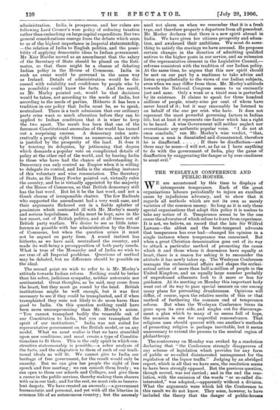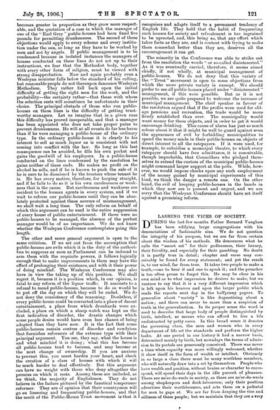THE WESLEYAN CONFERENCE AND PUBLIC-HOUSES.
WE are accustomed by this time to displays of intemperate temperance. Each of the great organisations labours periodically to injure an excellent cause by injudicious advocacy, and to show that it regards all methods which are not its own as merely varieties of the common enemy. So long as it is only these special organisations that adopt this policy it is useless to take any notice of it. Temperance seems to be the one cause the advocates of which refuse to learn from experience. It is not, we believe, on record that the late Sir Wilfrid Lawson—the ablest and the best-tempered advocate that temperance has ever had—changed his opinion in a single instance where temperance was, concerned. But when a great Christian denomination goes out of its way to attack a particular, method of promoting the cause which it and those whom it denounces have equally at heart, there is a reason for asking it to reconsider the attitude it has newly taken up. The Wesleyan Conference manages the ecclesiastical affairs and shapes the ecclesi- astical action of more than half-a-million of people in the United Kingdom, and an equally large number probably of unprofessed adherents look to it more or less for guidance. At its meeting on Monday this important body went out of its way to pass special censure on one among many plans for preventing drunkenness. Opinions will differ, of course, upon the relative merits of this or that method of furthering the common end of temperance reform. But when the Wesleyan Conference turns its guns upon its own side, and singles out for discourage- ment a plan which to many of us seems full of hope, the occasion is one for respectful remonstrance. That religious men should quarrel with one another's methods of promoting religion is perhaps inevitable, but it seems unnecessary to extend the process to the neutral region of philanthropy.
The controversy on Monday was evoked by a resolution declaring that "the Conference strongly disapproves of any scheme of legislation which provides for any form of public or so-called disinterested management for the regulation of the liquor traffic." Judging by an abridged report, which is all that we have seen, the resolution seems to have been strongly opposed. But the previous question, though moved, was not carried; and in the end the reso- lution, with the omission of the words "or so-called dis- interested," was adopted,—apparently without a division. What the arguments were which led the. Conference to this result we do not know. They seem, however, to have included the theory that the danger of public-houses becomes greater in proportion as they grow more respect- able, and the quotation of a case in which the manager of one of the "Earl Grey" public-houses had been fined five pounds for permitting drunkenness. The second of these objections would apply to every scheme and. every institu- tion under the sun, so long as they have to be worked by men and not by angels. If public management is to be condemned because in isolated instances the managers of houses conducted on these lines do not act up to their instructions, we fear that the Methodist body, a with every other form of religion, must be viewed with strong disapprobation. Now and again probably even a Wesleyan minister falls below the standard of his calling, but reasonable people do not thereupon denounce Wesleyan Methodism. They rather fall back upon the initial difficulty of getting the right men for the work, and the probability—the certainty rather—that those with whom the selection rests will sometimes be unfortunate in their choice. The principal obstacle of those who run public- houses on these lines is the difficulty of getting trust- worthy managers. Let us imagine that in a given case this difficulty has proved insuperable, and that a manager has been appointed who does not take proper pains to prevent drunkenness. He will at all events do far less harm than if he were managing a, public-house of the ordinary type. In the ordinary public-house it is clearly to his interest to sell as much liquor as is consistent with not coming into conflict with the law. So long as this last consequence can be avoided, he fills his own pocket and gains the goodwill of his employers. In a public-house conducted on the lines condemned by the resolution he gains neither of these ends. He makes no profit on the alcohol he sells, and if he is known to push the sale of it he is sure to be dismissed by the trustees whose tenant he is. He has every motive, therefore, for keeping straight, and if he fails to do so it is his own carelessness or weak- ness that is the cause. But carelessness and weakness are incident to the human agents in every system, and if we wait to reform our public-houses until they can be abso- lutely protected against these sources of mismanagement, we shall wait a long time. The only reform on behalf of which this argument can be used is the entire suppression of every house of public entertainment. If there were no public-houses to be managed, the absence of the perfect manager would be of no importance. We do not know 'w'hether the Wesleyan Conference contemplates going this length.
The other and more general argument is open to the same criticism. If we set out from the assumption that public-houses are evils which it is the duty of the authori- ties to suppress as soon as Parliament can be induced to arm them with the requisite powers, it follows logically enough that to make improvements in them may have the effect of prolonging their existence, and with it their power of doing mischief. The Wesleyan Conference may also have in -view the taking up of this position. We shall regret it, because it is a position which, in our opinion, is fatal to any reform of the liquor traffic. It amounts to a refusal to mend public-houses, because to do so would be to put off the day on which they will be ended. We do not deny the consistency of the reasoning. Doubtless, if every public-house could be converted into a place of decent entertainment, a place from which drunkards were ex- cluded, a place on which a sharp watch was kept on the first indication of disorder, the drastic changes which some people desire would have even less chance of being adopted than they have now. It is the fact that some public-houses remain centres of disorder and rowdyism that furnishes reformers of the extreme type with their principal argument. You see, they say, what the house is and what mischief it is doing ; what this has become all public-houses tend to become, and may become at the next change of ownership. If you are anxious to prevent this, you must harden your heart, and check the creation of a class of houses with which it will be much harder to deal effectively. But this argument can have no weight with those who deny altogether the premiss on which it rests. Among these are included, as we think, the majority of Englishmen. They do not believe in the failure pictured by the fanatical temperance reformer. They are of opinion that their countrymen will o on licensing and frequenting public-houses, and that the merit of the Public-House Trust movement is that it recognises and adapts itself to a permanent tendency of English life. They hold that the habit of frequenting such houses for society and refreshment is too ingrained to be uprooted, and, this being so, that any effort which takes facts as they are, and is content with trying to make them somewhat better than they are, deserves all the encouragement it can get.
The minority in the Conference was able to strike out from the resolution the words "or so-called disinterested." As it was eventually carried, therefore, it seems aimed chiefly, if not wholly, at municipal management of public-houses. We do not deny that this variety of the " Trust " movement is open to some objections from which the more private variety is exempt. We should prefer to see all public-houses placed under "disinterested" management, if this were possible. But as it is not possible, we are quite prepared to welcome the increase of municipal management. The chief speaker in favour of the resolution argued that if the profits were used for old- age pensions and recreation, the trade would be more firmly established than ever. The municipality would want money for these objects, and in order to get it would encourage drinking. This cause of alarm has just so much colour about it that it might be well to guard against even the appearance of evil by forbidding municipalities to spend the money made in their public-houses on objects of direct interest to all the ratepayers. If it were used, for example, to subsidise a municipal theatre, to which every ratepayer should have free admittance, it is conceivable, though improbable, that Councillors who pledged them- selves to extend the custom of the municipal public-houses might command larger support at the polls. While, how- ever, we would impose checks upon any such employment of the money gained by municipal experiments of this kind, we think the danger a remote one. On the other hand, the evil of keeping public-houses in the hands in which they now are is present and urgent, and we are sorry that the Wesleyan Conference should have set itself against a promising reform.







































 Previous page
Previous page